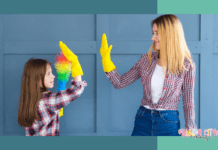Do your pre-teen kids play unsupervised? How old is old enough to stay home alone? When do you let your kids walk to a friend’s house by themselves?
Last week, Ashley shared with the rest of our contributor team an article about parents who were arrested after they let their pre-teens play unsupervised. It references a survey conducted this summer about Americans’ attitudes regarding children’s autonomy. Here are a few highlights:
- 68% of Americans surveyed think we should pass a law that prohibits kids from playing in parks unsupervised.
- 43% of Americans surveyed think that law should extend to children up to age 12.
- In response to the question, “At what age should a child be allowed to cook?” the median response was age 12.
- In response to the question, “At what age should a child be allowed to play in his front yard unsupervised?” the median response was age 10.
As you can imagine, the statistics and opinions in the article sparked a great conversation among the ACMB contributors about balancing our children’s autonomy and safety and how to nurture our children’s independence without risking their well-being. Our opinions are varied and strongly-held, and this is a loaded topic! We think the best way to present it is by giving our readers a peek into our conversation. Here is what members of our contributor team have to say about safety and risk, in their own words.[hr]

What did autonomy look like for you as a kid?
Ashley: We played unsupervised as kids all the time. We were gone for hours in the neighborhood. My parents let us roam free on my grandparents’ ranch with snakes, and the Guadalupe River, and cave climbing, and God knows what else. We flew alone to visit family around age seven. We never had curfews.
Denise: I grew up in a small town and was walking a mile to my grandma’s house when I was five or six. We played until the streetlights came on.
Maggie: My parents created a radius for me when I was in elementary school. It extended about two miles, and I could walk or bike to my friends’ homes or to destinations like the convenience store, park, and snow-cone stand. We always agreed on when I would come home, and I had a watch. It was my responsibility to be home on time.
Candice: My parents left my brother and me home alone for the first time when I was in first grade and he was in third. They came home at 2:00 A.M. My dad left us home alone for two weeks when we were 13 and 15. To be fair, he was a drug addict and was on the run from the law, but apparently he trusted us enough to fend for ourselves. We ate boxes and boxes of pop tarts; life was good.
Taylor: I played in my neighborhood unsupervised as a child, and I think my mom probably left me home alone to run to HEB when I was about seven or eight. I really can’t remember. I had a very loose curfew in high school, and I never really hit too much of a “let’s go crazy!” phase, because I’d always been given enough freedom as a teenager to not feel the need.[hr]
How are things different now than when we were kids?
Taylor: The world is a lot different than it was when we were little. It just is. San Antonio is a really big city, and people do seem crazier than they used to be. I’d be lying if I said that didn’t concern me.
Katy: Taylor, I hear “the world is different than it was when we were little” a lot. I’m interested to know more what that means for you. To my way of thinking, playground equipment is safer (rusty metal slides, anyone?), and I don’t think that people are “crazier” than they used to be. What I think has changed the most is that nowadays, it’s unusual to see a child who is not closely supervised. What’s different is how people respond to a situation that they deem “unsafe,” even if it was common 10 years ago. Perhaps also people are less willing to look out for other people’s kids, especially when they do not know them. Situations that used to be routine now seem alarming, and rather than observing and considering whether a situation is objectively safe or reasonable, people involve the authorities.
Taylor: I mean that it seems like crazier stuff is happening a lot more frequently. I don’t know why it’s happening, but it’s hard to deny that it is. From school shootings being so common that they now barely make headlines to what appear to be “normal” middle-class people being arrested for child pornography, every day there seems to be more, and every day it seems more shocking. And I get that a lot of that is because I’m able to read about it instantly, via the Internet, which didn’t exist when we were kids, but still. Maybe it’s just me, but yes, people seem crazier than they used to be.[hr]
How does the media (and social media) factor into your parenting fears?
Candice: The fact that we get news instantly these days also makes it seem like things are crazier than they used to be. Pornography is also easier to access and spread now.
Maggie: Yes, the 24-hour news cycle and its focus on ratings has left us with a feeling that the world is full of scary things, but I try to remember that it is the same story repeated over and over.[hr]
What’s your parenting philosophy when it comes to risk taking?
Maggie: We’re all about progressive responsibility: test the waters and adjust.
Katy: I’m with you, Maggie! Prepare your child for the road; give them wings. I’m even permissive with (reasonable) physical risk. To my way of thinking, the only thing sadder than a kid with a broken arm is a kid who never got to climb a tree.
Denise: We focus on teaching them common sense things: if something feels kinda out of place or wrong, then leave. We try to do that without making them feel fearful.
Maggie: Exactly, Denise! We spend a lot of time teaching our kids to know and trust themselves. We also work a lot on helping our kids stand up for themselves and others. It’s about awareness and comfort and knowing your limits.
Katy: Agreed! It seems that people are unwilling to really trust themselves and their children and instead take pride in hyper-vigilance.
Taylor: I don’t think of myself as being an overprotective parent and don’t envision myself as being that way later. I really am a huge proponent of allowing kids to make their own choices by taking calculated risks. But when it comes to matters of trust, then it’s not just about trusting my child but also the public, and that’s a little different.
Candice: I think being a conservative parent and an overprotective one are two different things. Honestly, I’m probably overprotective and just call myself conservative. Our 14-year-old has many rules and boundaries for her age. The strictest ones are related to social media, texting, and that sort of thing. She knows what I went through growing up and what having tons of freedom lead to in my life, so she understands why we have our rules in place.
Taylor: I will totally monitor computers and social media when my daughter is old enough. It’s not that I don’t trust her or that she shouldn’t be able to access certain things, it’s just that what is accessible and how easily it is accessible has changed a lot over the years.[hr]
What about the idea of “Safety First?”
Katy: Safety’s a big good, obviously. But other goods include courage, independence, physical skill, and knowledge. Why do all of those get ignored at the first possibility of risk?
Maggie: I think that safety is something you teach: it is in the way you manage yourself and are aware of your surroundings. It is the understanding that you have agency in any situation. Letting our boys practice in controlled environments gives me confidence that they can navigate in less familiar terrain.[hr]
How do you teach your kids to manage the world around them?
Maggie: I have a kid with a serious anxiety disorder, so I’m constantly helping him assess risk. His mind naturally wants to catastrophize everything. So instead of being fearful of everything, at our house it is really important that we understand the real risk in a situation and then practice being comfortable with our discomfort when the actual risk is low.
Denise: Exactly, Maggie! I’ve had two of those kids. You want them to navigate the world from a solid, grounded place instead of from fear. I’m famous for saying, “You can’t be the first person to (insert problem here), so there has to be a way to handle this.”
Katy: The whole “avoid risk” thing is a fallacy. My job is to teach my children to manage dangerous situations, because inevitably they will encounter them. If I’ve put all my efforts into screening them from life, they’ll lack the skills they need to manage on their own. I’m willing to manage my own feelings of nervousness to let my kids practice a bit of independence and gain necessary skills.
Candice: We give a little slack in the rope every year. The rules change with age: our oldest can cruise the neighborhood with friends (not alone), but we don’t let our eight-year-olds roam the neighborhood.
Maggie: We’re like you on that, Candice. One thing we do a few times a year (start of school, end of school, and birthdays) is ask the kids what privileges they think they are ready to take on. Sometimes we agree, sometimes we don’t. But if we don’t, we talk about milestones for them to achieve so we know they are ready. It has worked well for us, so far.[hr]
This conversation was a good reminder to me that we are all trying to do our best as parents. We may not completely agree on the approach, but our different choices are influenced by our circumstances and always reflect how very much we love our children.
What’s your approach to safety and risk? Please let us know in the comments below.











